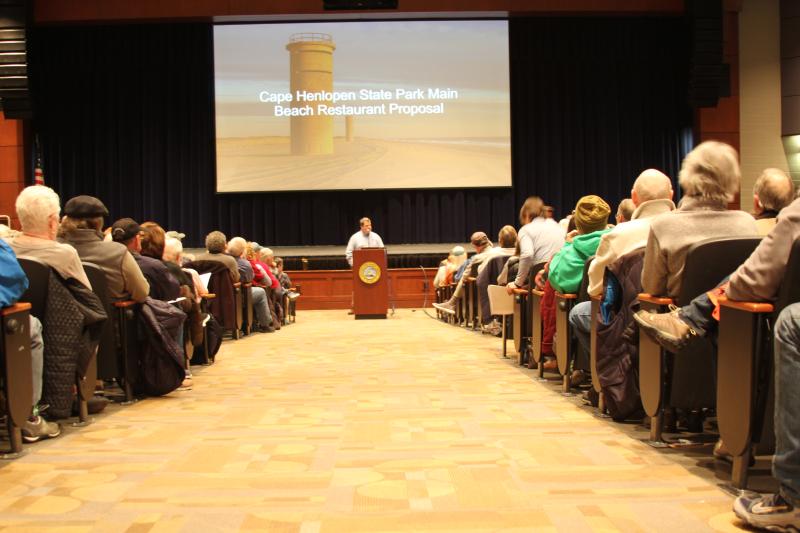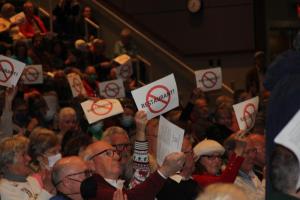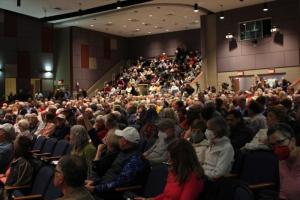A capacity crowd at Cape High erupted in cheers Dec. 5 after park officials announced a controversial restaurant plan for Cape Henlopen State Park was dead.
“DNREC and La Vida have mutually agreed not to move forward with the project at this time,” said Ray Bivens, director of the Department of Natural Resources and Environmental Control’s Division of Parks and Recreation, to cheers, applause and a sea of waving handheld signs with the word “restaurant” circled and drawn through by a red line.
Bivens’ announcement was made about 15 minutes after DNREC had sent out a press release stating the same.
Nearly 1,000 people attended the Lewes meeting to protest a plan that would have allowed La Vida Hospitality LLC to build a restaurant at the north side of the main parking lot at the state park – a plan in the works after La Vida was publicly awarded a food concessions contract in April. The contract came with a provision allowing the restaurant group to look into the feasibility of bringing a restaurant to the park, which is what the restaurant did.
Although the decision to shelve the plan had apparently already been made before public meeting even began, officials went on with a half-hour presentation explaining the public bidding process. Officials noted a June public meeting on the restaurant plan was sparsely attended.
That all changed by fall when a coalition of concerned residents formed to protest the restaurant, turning out in large numbers to a DNREC committee meeting at Killens Pond in November. The crowd prompted officials to schedule a second public meeting in December.
“I want to challenge you guys to think about how we [can] keep making this park great ... We’re part of the solution, and I ask that you treat my staff with respect,” Bivens said, noting the process had grown contentious in recent months.
Josh Grapski, managing partner of the La Vida group, said state park officials need to dive into issues brought up by the Preserve Our Park Coalition. An attorney for the group had first questioned whether a restaurant was permitted under the Warner Grant – a 340-year-old deed stipulating public use of the land for recreation, conservation and/or nature education uses. A law passed in 1979 was intended to clarify public/private use of Warner Grant Trust lands.
The coalition followed up by reaching out to the National Park Service over whether state park officials violated federal regulations under the Land and Water Conservation Funds Program and Federal Lands to Parks.
“It is very clear that Delaware State Parks needs to dive deeper into the broader questions brought up by those who are against the proposed restaurant. The Warner Grant, the potential environmental impact and the public’s desire for such an improvement needs to be addressed,” Grapski said. “As a result, we have decided it is time to pause any of our efforts to allow these to be addressed by the parks.”
Before the meeting opened for public comments, Bivens asked audience members to share ways they believe the park can be improved, although many took the podium decrying the rejected plan.
Lewes resident Pat Fowler echoed concerns over trash that a restaurant would generate to the detriment of the surrounding natural habitat. “This restaurant would ruin that,” she said.
Christine Besche, one of the organizers of the coalition, brought up a statewide comprehensive recreation plan that was signed by Gov. John Carney, and other DNREC officials, including Bivens.
“There’s nothing in the survey that promotes restaurants, but it does promote healthy lifestyles and recreation,” she said. “How does a bar and restaurant that serves alcohol and fried food in any way promote healthy Delaware?”
Others said there are plenty of restaurants in the vicinity, and another one is not needed in a nature preserve.
Newly elected Sen. Russ Huxtable, now representing Lewes and Rehoboth Beach in a seat once held by Ernie Lopez, said he was pleased to see the capacity crowd and he expects discussion of the Warner Grant will continue after the legislative session convenes in January.
“I look forward to whatever proposals do come forward so the General Assembly can vote on those,” he said.
Preserve Our Park issues statement
The Preserve Our Park Coalition released the following statement Dec. 6.
“Thank you, Delaware, particularly residents of Lewes and Sussex County. We urged you to turn out for the public meeting with DNREC Dec. 5, and hundreds of you answered the call. That was the culmination of a whirlwind three months when countless members of the community contributed their time, talents and money – often day and night – toward achieving a common goal. Your dedication was inspiring, your support was uplifting, and your efforts made a difference.
“Speaker after speaker explained what the park meant to them and why the bar/restaurant proposal would damage that connection. Some were humorous. Some brought props. Some were transplants to the area, and some were Sussex born. Virtually all were united in their opposition to the project.
“We also thank DNREC, specifically the Division of Parks and Recreation, and La Vida Hospitality Group for withdrawing a proposal that how ever well-intended was seriously flawed. Thanks for hearing our message: we ask that you listen to our views as you consider the park’s future. Find ways to tap the deep and abiding passion we have for our remarkable park. People all across Delaware were inspired to work together for the greater good of their community and state.
“Preserve Our Park is committed to preserving the incredible natural treasure bequeathed to us from William Penn through the Warner Grant. We will continue to work with both elected and appointed public officials to seek solutions that remain true to the park’s original vision: striking a harmonious balance among public recreation, conservation and nature education.
“The park needs improved food service, more restrooms and updated utilities. To deliver these, we need to find additional funding sources. Solving these problems is a shared challenge. As the community has demonstrated, it is ready to help.
“Now we put our heads together to create a positive outcome – more revenue to meet the park’s legitimate needs. The southern Delaware community has enormously talented residents with skills that can successfully complete this task. Preserve Our Park will help mobilize these public resources while maintaining the character of our park.”
Melissa Steele is a staff writer covering the state Legislature, government and police. Her newspaper career spans more than 30 years and includes working for the Delaware State News, Burlington County Times, The News Journal, Dover Post and Milford Beacon before coming to the Cape Gazette in 2012. Her work has received numerous awards, most notably a Pulitzer Prize-adjudicated investigative piece, and a runner-up for the MDDC James S. Keat Freedom of Information Award.


















































